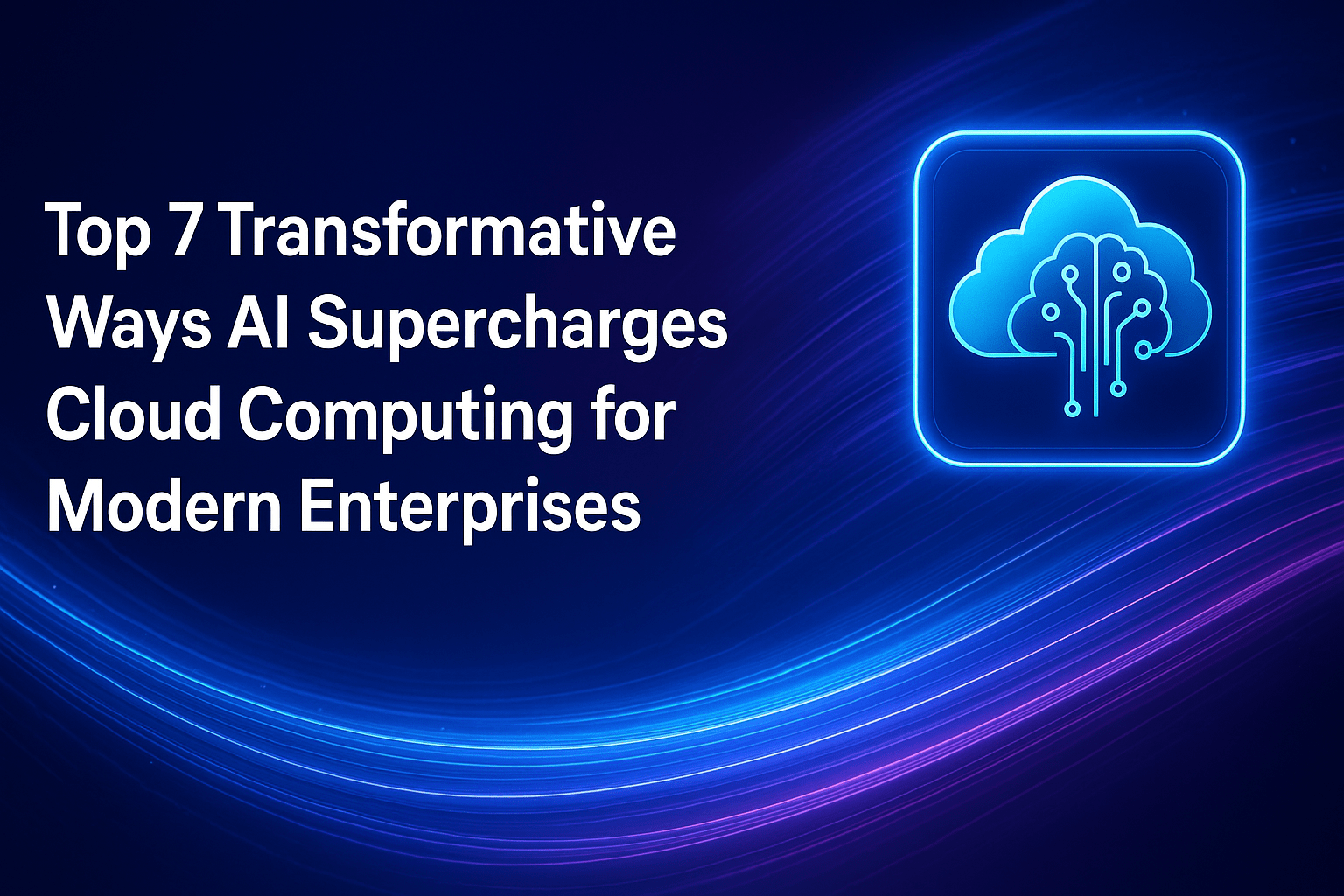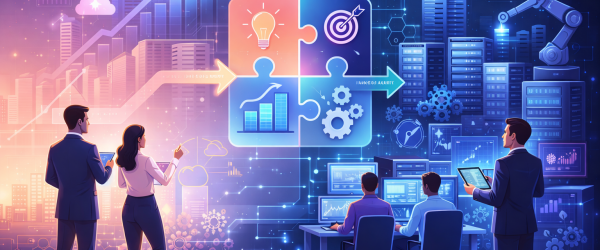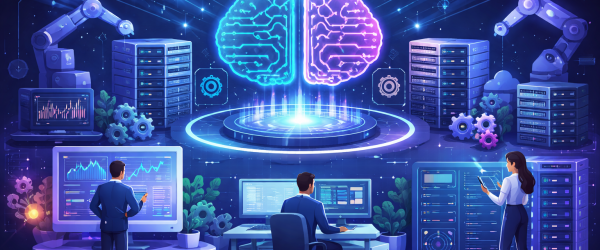🧠 Introduction: The Power Duo—AI and Cloud Computing
AI and cloud computing are no longer futuristic concepts—they are present-day powerhouses transforming how enterprises operate. When these technologies converge, they unleash incredible potential: automation, cost-efficiency, hyper-scalability, security, and business agility. For modern enterprises, leveraging AI in cloud computing is not a luxury but a necessity to stay ahead in a competitive digital landscape.
Let’s explore the top 7 transformative ways AI is redefining the cloud experience for businesses, empowering them to operate smarter, faster, and more securely.
🚀 1. Smart Resource Management: Boosting Efficiency and Cost Savings
One of the biggest challenges in cloud computing is optimizing resource use. AI steps in as the smart brain, managing cloud resources dynamically and efficiently.
🔍 Predictive Analytics for Demand Forecasting
AI systems can analyze historical usage data, traffic patterns, and business needs to forecast demand. This means no more over-provisioning or under-provisioning of resources.
Example: AWS and Azure use machine learning algorithms to predict user demand and adjust resources accordingly.
🔁 AI-Powered Auto-Scaling
AI can trigger automatic scaling of computing resources based on real-time traffic loads and application performance, ensuring businesses only pay for what they use.
Key Benefits:
- Cost optimization
- Reduced operational complexity
- High availability
🛡 2. Next-Level Data Security Through AI
Security threats are evolving, and traditional defenses are no longer enough. AI enhances cloud security by offering intelligent, proactive protection.
⚠️ Threat Detection and Real-Time Response
AI algorithms detect malware, intrusions, or unauthorized access attempts instantly and initiate countermeasures without human intervention.
🧬 AI-Based Anomaly Detection
AI can baseline normal network behavior and flag anomalies that signal potential threats—even zero-day attacks that haven’t been cataloged yet.
Notable Fact: Google Cloud uses AI to prevent DDoS attacks by identifying unusual traffic in milliseconds.
🧪 3. Accelerated DevOps and Agile Workflows
AI in cloud environments supports faster development and deployment cycles by automating DevOps practices.
🔧 Continuous Integration and Delivery (CI/CD) Optimization
AI analyzes past builds, tests, and deployment logs to optimize CI/CD pipelines, identifying what’s slowing the process.
🤖 Intelligent Automation for Testing and Deployment
With AI, regression testing, bug detection, and performance testing can be automated. AI bots can even predict deployment success and rollback risks.
Why it matters: Teams can innovate faster with fewer bugs and shorter release cycles.
💬 4. Enhanced Customer Experiences with AI and Cloud
Customer experience (CX) is a business differentiator. AI-driven cloud services offer real-time personalization and intelligent support.
🤝 Intelligent Chatbots and Virtual Assistants
Using NLP (Natural Language Processing), AI-powered bots offer human-like interaction, instant responses, and 24/7 support.
🎯 Personalized User Experiences Using AI in the Cloud
Cloud-hosted AI models collect and analyze user behavior data to personalize recommendations, product listings, and content delivery.
Example: Netflix uses AI on AWS to analyze user preferences and deliver content suggestions.
📦 5. Scalable Data Storage and Smarter Processing
Enterprises generate massive data daily. AI helps manage and process it more effectively.
🗃 AI-Driven Storage Tiering and Management
AI identifies which data is frequently accessed and which isn’t, automatically moving it to appropriate storage tiers to save cost and increase efficiency.
💡 Distributed AI Models for Large-Scale Processing
With cloud platforms like Google Cloud and Azure ML, enterprises can deploy distributed AI models that scale across data centers for high-speed processing.
⚙️ 6. Disaster Recovery and Predictive Maintenance
Unexpected downtime costs millions. AI in cloud computing helps prevent disasters before they strike.
🔍 Proactive System Health Monitoring
AI tracks system performance, identifies anomalies, and alerts teams before failures happen.
🔮 AI Forecasts for Disaster Recovery Planning
AI can simulate disaster scenarios, helping companies create better backup, redundancy, and recovery strategies.
Real-world Application: IBM’s Watson is used in infrastructure to predict equipment failure and suggest preventive maintenance.
🌱 7. Environmental Sustainability and Energy Optimization
As cloud infrastructure grows, so does its environmental impact. AI helps mitigate this.
🌐 AI for Efficient Resource Utilization
AI optimizes server load distribution, cooling systems, and energy usage in data centers.
♻️ Carbon Footprint Reduction with Cloud + AI
Companies can now monitor their carbon emissions in real-time and adjust operations to meet ESG (Environmental, Social, and Governance) goals.
Microsoft’s Azure Sustainability Calculator uses AI to track and report carbon emissions across cloud operations.
❓ FAQs: Everything You Need to Know About AI in Cloud Computing
1. What is the role of AI in cloud computing?
AI helps automate, optimize, and enhance cloud operations like resource management, security, and customer engagement.
2. Is AI in cloud computing secure?
Yes. AI enhances cloud security by offering real-time threat detection, anomaly monitoring, and autonomous incident response.
3. How does AI reduce cloud costs?
AI enables auto-scaling, storage optimization, and efficient resource allocation—ensuring you only pay for what you use.
4. Can small businesses benefit from AI in cloud computing?
Absolutely. Many cloud providers offer AI-driven tools suitable for startups and SMBs, making it affordable and scalable.
5. Which cloud providers offer AI capabilities?
Major providers like AWS, Google Cloud, Microsoft Azure, and IBM Cloud have integrated AI tools and services.
6. How is AI used in customer experience via the cloud?
From chatbots to recommendation engines, AI enhances CX by offering real-time support and personalization.
🔚 Conclusion: A Future-Ready Strategy
AI and cloud computing aren’t just buzzwords—they’re foundational to building agile, intelligent, and future-proof enterprises. From smarter workflows to proactive security and cost-effective operations, this powerful duo helps businesses scale rapidly while maintaining quality and security.
The adoption of AI in cloud computing isn’t a trend—it’s a strategic move toward digital transformation.
Start exploring the synergy today, because the future belongs to the intelligent enterprise.







